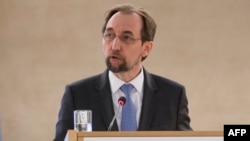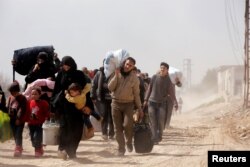The U.N. Human Rights Chief chastised the Syrian government Monday for its role in starting the conflict in its country and criticized the Security Council for not being more decisive in ending the suffering.
“It all began seven years ago almost to the day with the torture of children, and the impunity given by the Syrian state to those torturers,” High Commissioner for Human Rights Zeid Ra’ad al Hussein said. He was referring to a group of school boys from Daraa who in 2011 painted anti-government graffiti that led to arrests, a crackdown on peaceful protests, and eventually full-fledged conflict.
“The Syrian government also claims it makes every effort to protect civilians,” he continued. “But when you are capable of torturing and indiscriminately killing your own people, you have long forfeited your own credibility.”
Shared blame
The government of President Bashar al-Assad has said it is only conducting counter-terrorism operations, not attacking its own civilians.
“To push back terrorism, one must refrain from adopting the unprincipled and vicious attacks on innocent people that are the very marker, the very distinguishing feature, of the violent extremist groups themselves,” al Hussein said.
The high commissioner also noted that, “unlawful methods of warfare have been used by all parties to this conflict,” not just the government.
Security Council responsibility
He scolded the U.N. Security Council for not taking “decisive action” to defend human rights and prevent further loss of life, including using and threatening the use of the veto to protect parties to the conflict.
“The Syrian conflict, and the impunity that characterizes it, is breaking our world,” al Hussein said.
He again called for atrocities committed in Syria to be referred to the International Criminal Court at The Hague. An unlikely action, as it would require a Security Council referral and Russia has used its veto 11 times since the start of the conflict to spare the Assad government from sanctions or other measures.
The High Commissioner said accountability must be a part of any political settlement because without it, “such a settlement would be utterly empty.”
Briefing delayed
The human rights chief was almost prevented delivering his public briefing, as Russia moved with support from some of its council allies to block his speech in the Security Council. Arguing that human rights is not a subject on the council's agenda, the Russian delegation won a procedural vote to cancel the meeting.
Council members who called for the briefing quickly regrouped and moved it outside the council chamber to a U.N. conference room and held it in an informal but public setting.
“I’m not surprised that Russia did not want this meeting to happen,” British envoy Jonathan Allen told the meeting. “The truth of what is happening in Syria is deeply uncomfortable for all who protect Assad.”





